“Location 11 sank.”
“But that means…”
“Yeah, we can’t get there in 4 turns.”
“So that’s how it ends? We draw a random card that is impossible to hedge and we now lose?”
“Well, technically we could have moved an extra tile last night… but then we couldn’t have called the pilot.”
“No, wait, we can still search with the captain and he might draw the card that moves the sinking location… but then we waste an action, so we’re at the same place.“
“OK, well, weird. Feels a bit dumb, if you ask me…”
Carnival Zombie is a game for 1-6 players, the story takes place in current-day Venice, where your characters are minding their own business, and then suddenly, zombies! You have three days and four nights to get out of the city or kill the ancient leviathan that is causing the afore-mentioned zombification. Oh, and the city is also sinking.
Regardless of the number of players, you always control the same six characters, all unique, with different names, weapons, items, day and night actions. You have your team-leader captain, a lady sniper, a quick-moving harlequin assassin, a brute with a machine-gun, an engineer, and a doctor. They all seem to be participating in the carnival, at least they are all wearing those creepy masks, but they are also very handy with weapons. Don’t think too much about the setting or backstory, the creators certainly didn’t!
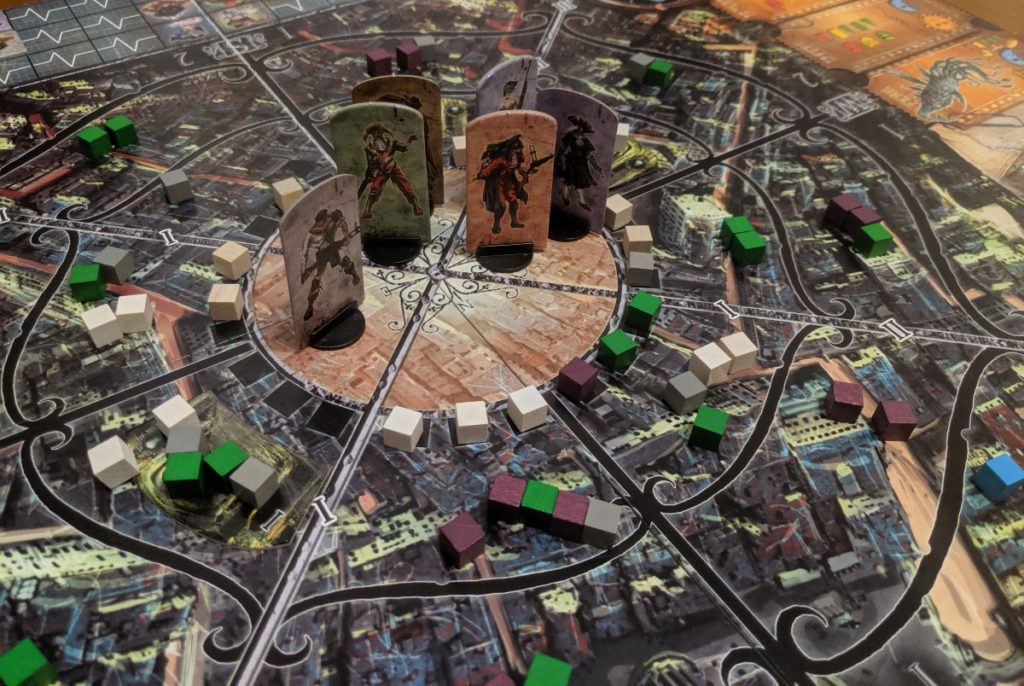
The gameplay is a series of day and night cycles. During the night, you take cover behind a line of barricades, and fight the enclosing horde of zombies in wave-based combat. During the day, you move through the map of Venice, work on your escape plan, heal your wounds from the night, or search for items / survivors.
The fourth night of the game (if you survived that long) is your chance to escape. You might try to cross a bridge, catch a boat, or call an airship for evacuation. Or, true story, find the holy hand grenade, and kill the leviathan. I guess that last one would be the “good ending”.
Oh, and it’s important to highlight that this is a review of the “good old” first edition version, not the Kickstarter version. Which we also kickstarted so there you go, spoilers, we probably like the game a lot, right? Well, let’s find out.
The Good
The night fights are intense and vicious, they are a great math problem, and a great co-op experience. The interesting bit is that most things are not random. You draw zombies randomly, sure, but damage and movement are pre-determined. One character might be able to shoot far for a single target, others can do area damage in close encounters. Same with the four different types of zombies, you know how much they move each turn, how difficult it is to kill them, and how much damage they do.
The combat is literally never not exciting. Sure, the engine is not as clever as Pandemic, you simply get too many zombies to kill all of them, but when the dawn finally arrives, it’s always a terrific experience, and does feel like you have earned it. You are making meaningful choices in every single turn for every single character. As the game progresses, the situation becomes more and more hopeless, your characters accumulate wounds, your resources dwindle, and more and more bosses arrive during each night.
Right, the bosses. Other than your regular foot soldier zombies, there are eight different boss zombies, and they are great, with different and very thematic skills and stats. Some might stay back and inspire others to move faster, have a long-range tentacle attack, or can destroy all your barricades with their tenor-power. And some might just take forever to kill and do insane damage once close. The funny part is you technically don’t have to kill the bosses, you just need to survive the night and then run away.
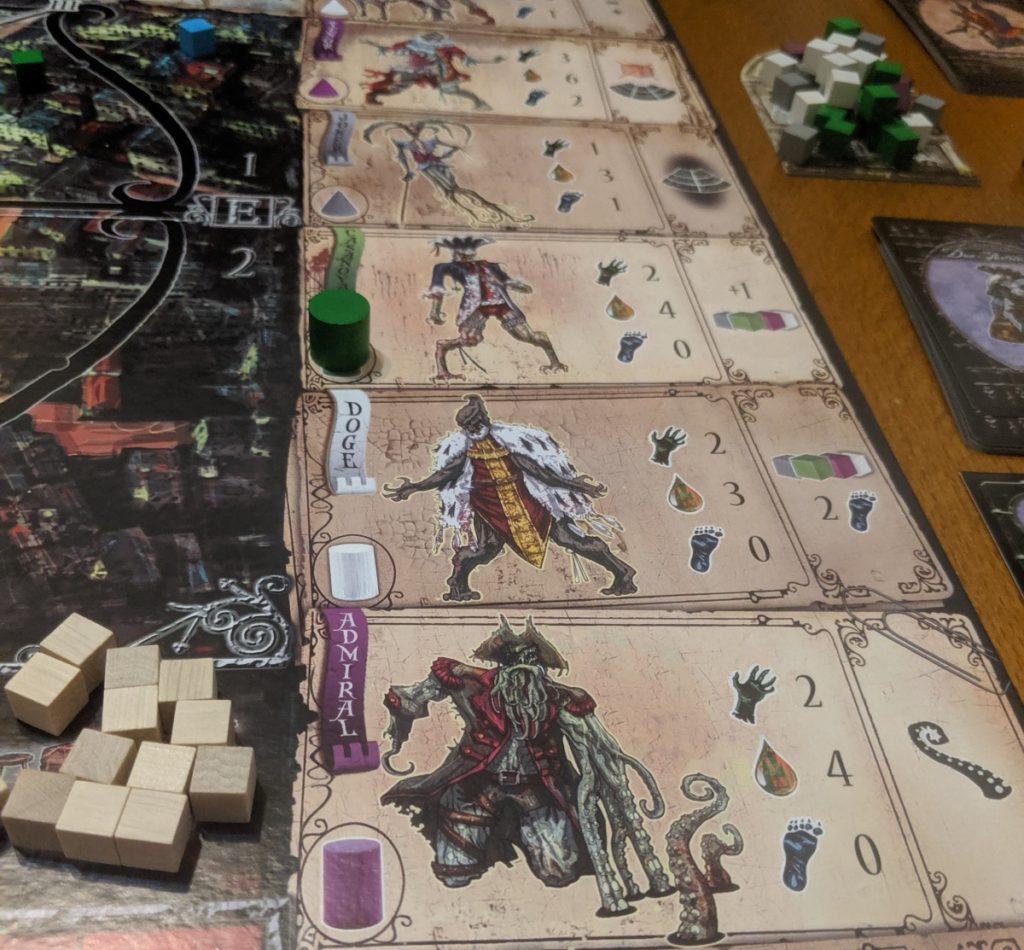
Other than your characters, which are paper standees, everything is represented with colourful wooden cubes (or cylinders and cones in case of bosses). Which might sound lame, but I absolutely love it. The artwork is printed on the game board, so you always get a clear picture of how you should imagine the enemies, and handling them is super easy this way. I would hate to have cheap plastic minis instead of this solution. I don’t know how the game does it, you place a purple cylinder on the board, and bamm, admiral, you are afraid now. (I’m really looking forward to painting the bosses in the new edition, but I still hope that they keep the regular zombies as wooden cubes.)
Speaking of artwork, it’s usually gorgeous. The game board could be framed and put on a wall as a piece of art, it’s vibrant and colourful, the zombies all look different, characters too. The only not-so-great aspect is the artwork on the item cards, that is kinda meh. Everything is laminated, that part of the production value is superb (more on the dark side of the production value in the next section…), everything fits neatly in the box. It’s kind of surprising how little stuff you get and how busy the game becomes when you put it on the table and start playing.
The complexity is perfect for your norm friends who are generally smart but not board game enthusiasts. The usual gateway games like Pandemic are great, but then I quite often feel like the next step is kinda large. There is not much between Pandemic and Spirit Island in terms of complexity. And this game perfectly fills that role. You have your own characters, you have to micro-manage them, they have their items, but you know, not too much.
The game is quite unique and weird. You know that feeling when you play a Fantasy Flight Games, especially if it’s Lovecraft-related, and you kinda know what is going to happen and how the game mechanics are going to work? Carnival Zombie is the opposite of that. It really feels like an outlier game with gameplay solutions I have never seen anywhere else. Perhaps the most interesting part is the pile of corpses. See, these are zombies, they don’t really die. So every time you kill one, there is this weird dexterity minigame, you have to drop (not place, drop!) the wooden cube on a small piece of… well, terrain, I guess. That is easy to do at first, but there is enough place for like 20 cubes, and you might kill 50 in a night, so you start stacking them, which is more and more difficult. If any of them drops: they resurrect, and you get stress. Right, stress, that’s another thing, your characters have no health level, they are just stressed. But I could continue, barricades work in a weird way, this whole minigame during the day when you search for items or survivors, strategising on the map, deciding where to stop for the night, the different and random endings. The game is full of these solutions. Are they all good? Well, no, and we are almost at the part where I start talking about what sucks in this game.
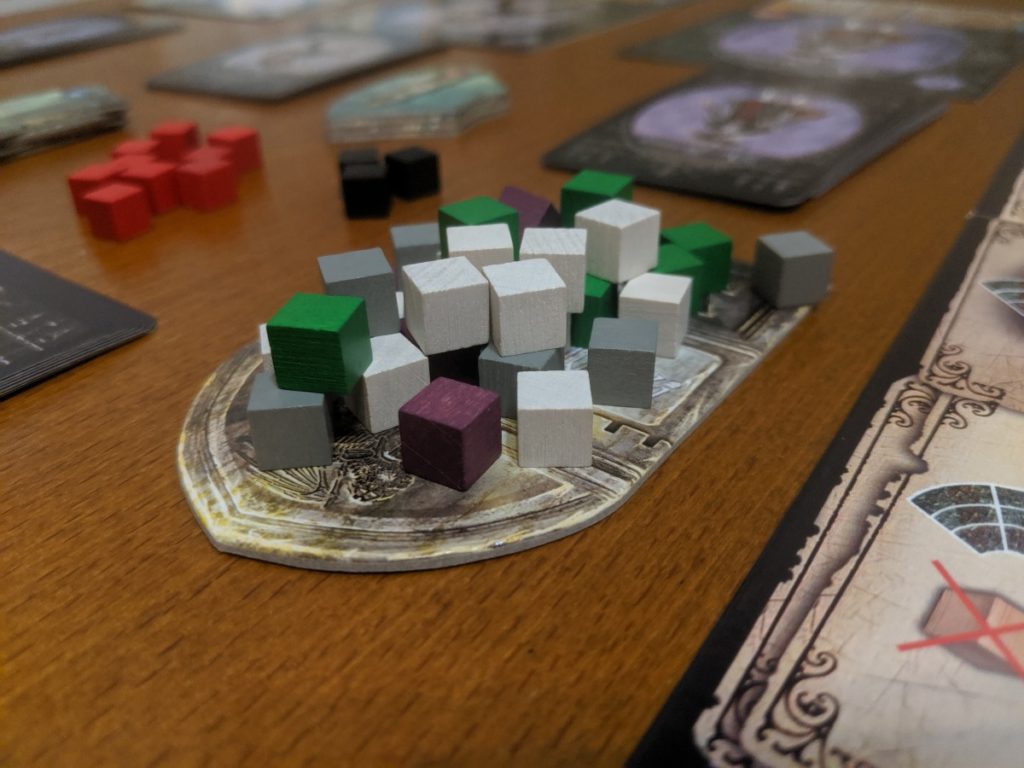
And finally, on a personal note. To me, this game always feels like a game that is, you know, somewhere else. Maybe at your grandparents’ house, maybe you found it on a shelf in a weird hotel. You open it, and your first thought is going to be “wait a minute, that’s not how board games look, and who are these people who made it, are they Italian, never heard of them“. I can’t really put my finger on this feeling, none of my playmates share my thoughts, so it could just be me, but to me, Carnival Zombie has this unparalleled mysterious aura, and I love it.
The Bad
From the perspective of “all is well if it ends well”, well, the game is usually… not well. Starting it is great, the first two nights are fun. But very rarely does it come to a satisfying conclusion:
- Every day, a random location sinks, you can’t stop there, and takes extra time to leave. It’s easy to lose that way.
- You might just slowly bleed out and can’t continue.
- Or, which is probably the worst, you get to an ending, and it’s super-duper lame.
And when I say super-duper lame, I mean it. Imagine that you spent 2-3 hours calculating every single shot, carefully placing your characters, building up the barricades, gathering items, using your game-changing abilities, to arrive at the Boat escape option, and then you get an annoying and primitive minigame that has nothing to do with the rest of the game. Everything is abstracted out, the only thing that matters from your characters is the health bar, no items can be used, no skills, nothing, and then you have to solve this super lame puzzle of arranging cards in a certain way. But because the steps are really obvious, it’s just a half-hour long random number generator. Did you survive the game or not? Well, let’s flip 50 coins, and find out! Not fun at all. To be fair, the boat is the worst ending, but even with the endings that are better, you have to spend 15 minutes reading the ending-specific rules, so the game comes to a screeching halt.
Certain aspects of the production value are incredibly messy, I have literally never seen anything so bad in a board game before. Every text is printed on the cards in two languages, Italian and English, which already looks weird, but the big issue is that some sections in the rulebook are not translated at all. This really baffles me, because a quick read-through would have prevented it. And I’m talking about things like skills of a specific boss. In general, the rules are very often not straightforward, and it’s not a really popular game, so resources online are scarce. You have to house-rule a lot. Example: with the engineer, you can build 4 barricades in a turn, and then you get an item that says you can build 4 barricades instead of 3. So maybe that applies to other players, should we play that way? An item that grants an extra shot for the Fire action, is that just the character, or everyone else? But why does it specify on a third card that it affects every other character too? The game is full of these little questions, and you will need to house-rule a lot.
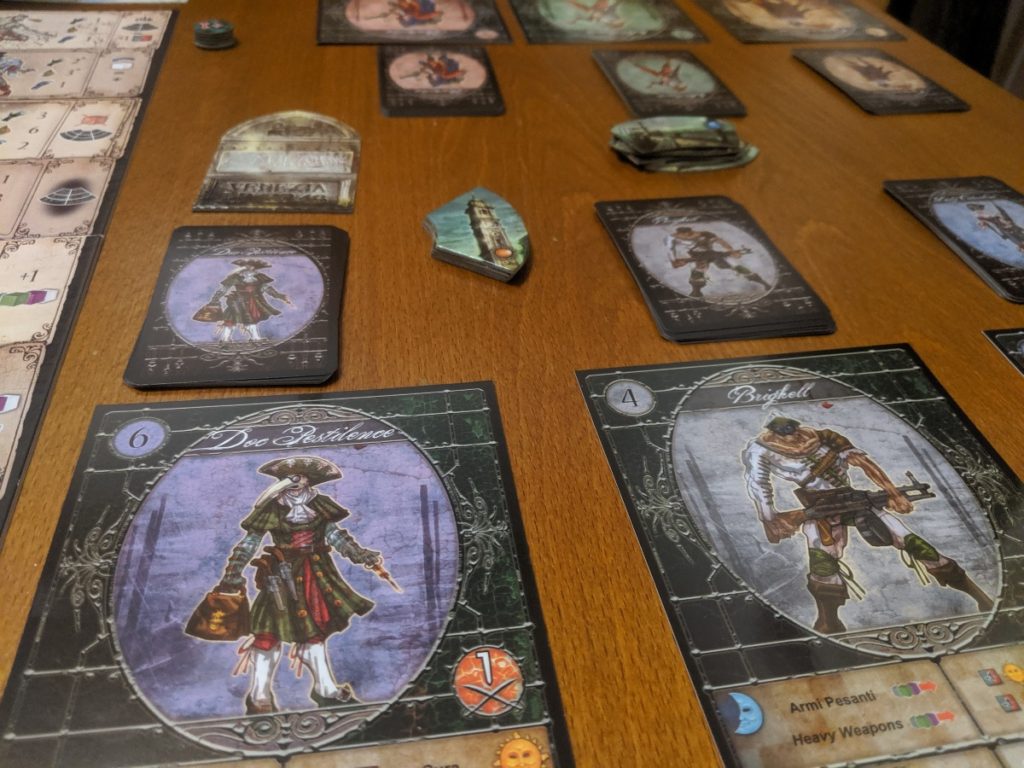
Insistence of randomness is super weird. As I mentioned earlier, the fight is predetermined, that is great, fun, and challenging. But everything else is randomly determined. Oh, you want to do the airship escape? Well, you need to stop at this specific location and call the pilot. You realistically have 2 actions to try that. Draw a card, it will tell you if you succeeded. If you didn’t, well, you couldn’t call the pilot, sooo… And you can’t believe that this was deemed to be a good gameplay mechanic. It’s not like you can flexibly change strategies, you kinda have to decide which escape route to go for at the beginning of the game. Oh, you want to kill the Leviathan? You need to find the holy hand grenade. One of the characters have it in their deck of item cards. You didn’t draw it randomly? Well, too bad. No ending for you.
Another thing about the items is that searching for them is simply a luxury you can’t afford on higher difficulties. You have these fun and thematic weapons and special items in your character-specific deck that could change the course of the game, but you hardly ever see them.
I praised the complexity earlier, well, the difficulty setting is terrible. Easy is a cakewalk and not challenging, medium is too hard for it to be fun, and I’m convinced that hard is impossible to win.
I have played this game like 20 times, but that’s just because I quite like games. I have to say, the replay value is not great. You always play the exact same six characters, there is no scaling, it plays the same, regardless of the number of players.
Iconography and game design is more annoying than helpful, you have to consult the rulebook a lot. I’m also told that the game is quite sexist with the one female character dressed as a prostitute, see picture below.
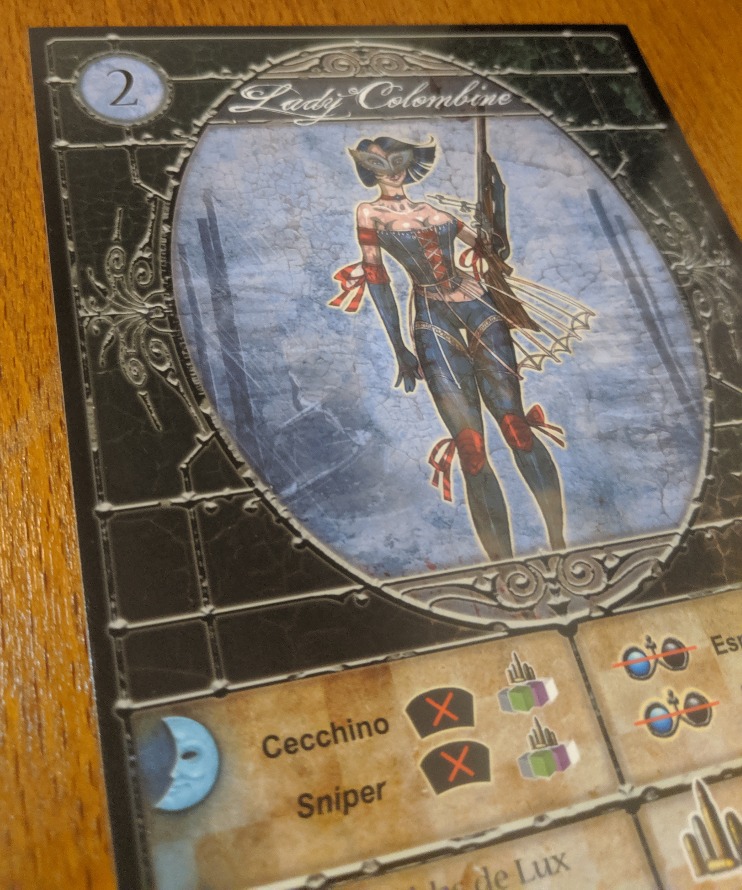
The Co-Op
Co-op is great, strategising together is great fun, tense, story aspect is also good. Interestingly, you do feel attached to your characters, and there is even room for some role-playing. This might sound weird, but that random aspect that I hated on earlier – it’s actually not that terrible as a team experience. Oh my god he’s drawing the card that will decide the fate of the game, will he succeed, will he…? And every game has a moment like that.
On the other side, you can easily micro-manage other players’ turn, if you feel the urge. It is not the sweet spot like the best co-op games where you have to discuss the general strategy but every player has to think through their specific moves. You need to have a good balance between the players.
Overall, I really enjoy the co-op experience, it’s usually a long, intense game.
The Recommendation
It might not be obvious because of the long list of jarring errors, but I do deeply love this game, and I have very fond memories playing it. It is a very unique experience, kind of an acquired taste, and I am quite proud to have explored it.
But do I recommend it? Absolutely not. I also have a hard time recommending something similar instead, as I mentioned earlier, this is a very unique game, both in terms of game mechanics and pacing. And maybe there is a reason that these unique features are not implemented in more games…
Info
| Release Year | 2013 |
| Genre | Luck, Strategy |
| Difficulty | Hard |
| Number of Players | 1 to 6 |
| Length | 2 - 3 hours |
Rating
| Overall | Mediocre |
| Story | Good |
| Co-Operation | Great |